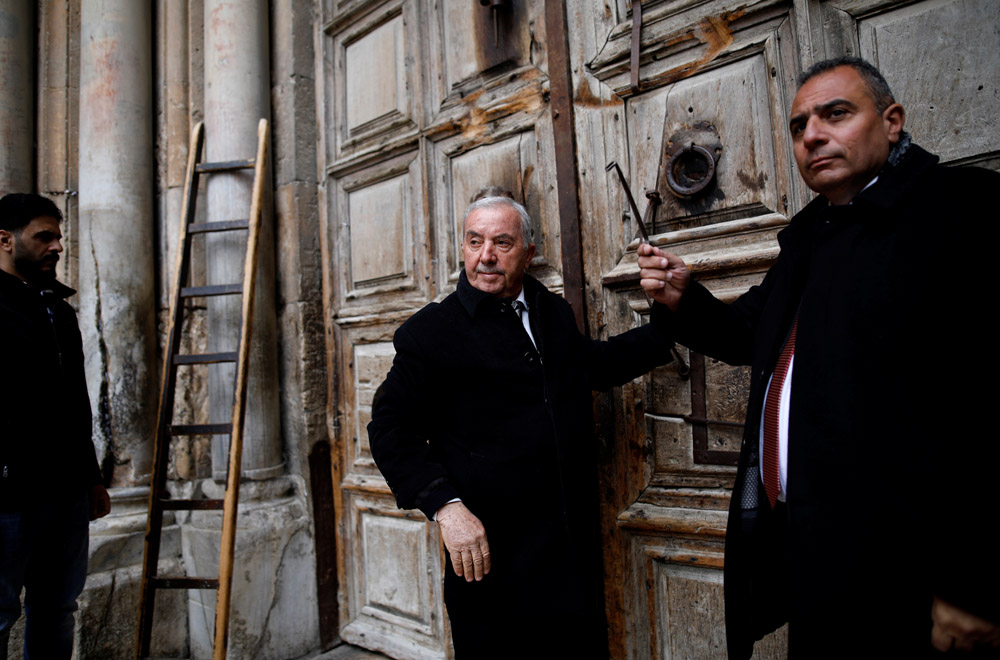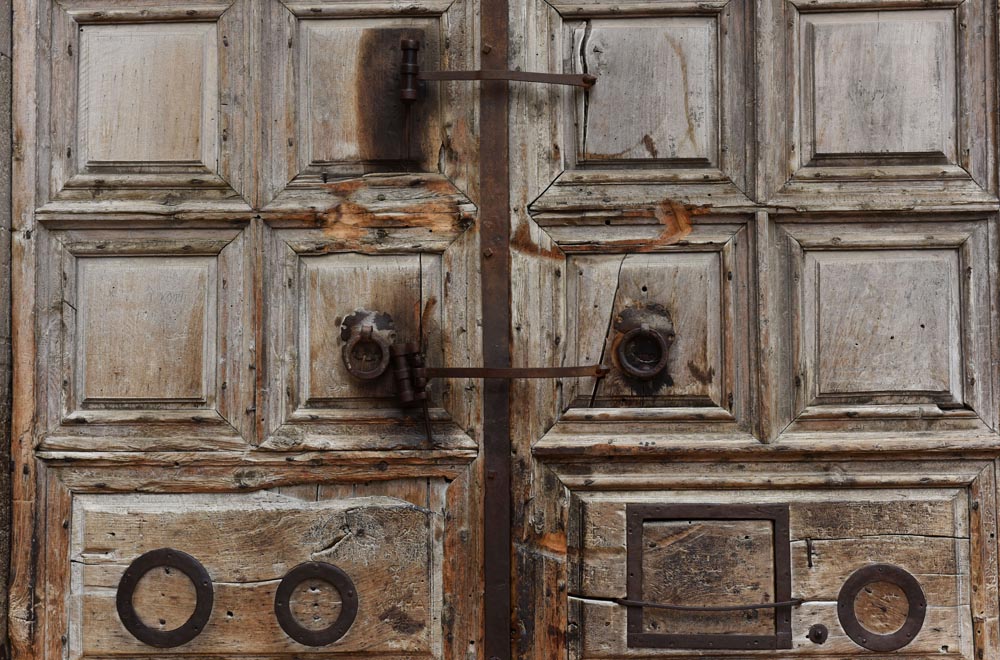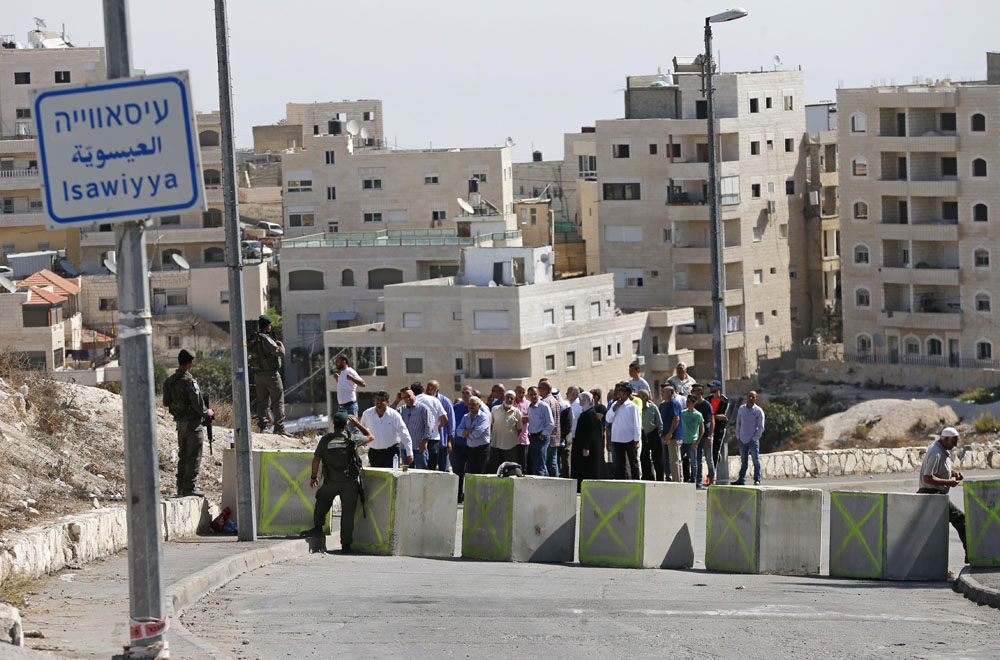
Adeeb Joudeh, right, and Wajeeh Nusseibeh prepare to open the doors to the Church of the Holy Sepulcher on the morning of Good Friday in Jerusalem's Old City, March 30, 2018. (Reuters/Corinna Kern)
A Jerusalemite Muslim family that holds the key to the Church of the Holy Sepulcher has come under attack after one of its homes in the Old City ended up in the hands of a right-wing Israeli settler group.
The Joudeh family has held on to the key of the church since the 12th century. Another Muslim family, the Nusseibehs, is entrusted with opening and locking the church every day, a task one of its members performs with Adeeb Joudeh, the key's custodian, per tradition, as a safeguard against one Christian sect being favored access over another.
But the Joudehs are under community pressure to relinquish the key, after it emerged that the house of Adeeb Joudeh ended up with Ateret Cohanim, an Israeli settler group that buys Palestinian houses, often through intermediaries, to settle Jewish families in historical Palestinian neighborhoods of East Jerusalem to shift the city's demographics.
Adeeb Joudeh, who is facing death threats and public shaming, said he should not be blamed for the outcome and that he sold the house to a Palestinian businessman named Khaled al-Attari, who has since disappeared. Palestinian Prime Minister Rami Hamdallah has set up a committee to investigate.
"It's regrettable that [al-Attari] was recommended [for the sale] by community leaders, including the Palestinian Authority minister for Jerusalem affairs," Joudeh said. "After the house was sold to the settlers, none of the people who recommended al-Attari called to apologize or to say that they themselves were duped. Unfortunately they all buried their heads in the sand."
In East Jerusalem, a home-by-home struggle for ownership rages. When Palestinian homes find their way into the hands of Israeli Jews, the original owners are shunned, having dishonored the community and further diminished Palestinian aspirations to build a state with East Jerusalem as its capital.
Palestinian law forbids the sale of property or land to Israelis — it's a crime punishable by death — but it has not been formally enforced since Mahmoud Abbas became president of the Palestinian Authority, or PA, in 2005.
The Palestinian Authority is also powerless to prevent such sales in East Jerusalem where it has no jurisdiction. Israel occupied the eastern part of the city in 1967 and annexed it in a move not recognized by the international community.
In late October, a petition began to circulate signed by members of the Joudeh clan, calling for Adeeb Joudeh to relinquish the church key and pass it on to another member of the family. But Joudeh said that the people who signed it were members of an Amman, Jordan-based family that shared the same name and were not related to him.
"When I was given the key to the Church of the Holy Sepulcher, I did not take it from the Joudeh family; I inherited it from my father. This key is passed through the generations from father to son," Joudeh said.

A close-up of locked doors of the Church of the Holy Sepulcher is seen Feb. 26, 2018, in Jerusalem's Old City. (CNS/Debbie Hill)
"We are a renowned family and one of the oldest in Jerusalem and we don't sell our property to Israelis. When we first thought of selling the house, we turned to the Jerusalem Islamic Waqf [Islamic religious trust] and to several Palestinian institutions, but they didn't have the capacity to buy the property," said Joudeh. "We sold the house to a Palestinian who came highly recommended by community leaders."
Those involved in such sales are often accused of committing high treason, for which even the dead cannot be forgiven: Last November, a Muslim cemetery refused to bury a Palestinian man who died in a car accident over suspicion that he sold property to Israeli Jews. Eventually, a Jewish cemetery agreed to bury his body.
In December, a 50-year-old Palestinian man with Israeli citizenship from the town of Jaljulya, Israel, was shot to death near his home. Israeli media reports said he was wanted by the Palestinian Authority for selling property to Israeli Jews. His father had also been killed for the same alleged crime.
Palestinian Authority security forces have gone after those involved in the sale of the Joudeh home. On Dec. 31, a Palestinian court in Ramallah sentenced Issam Akel, a Palestinian-American man from Jerusalem, to life in prison and forced physical labor after he was convicted of selling property to settlers in the Old City.
After Akel's arrest in October, Israeli authorities detained Adnan Ghaith, the Palestinian Authority governor of Jerusalem, multiple times, accusing him of cooperating with Palestinian security forces to arrest Akel. The PA minister for Jerusalem affairs, Adnan al-Husseini, was also arrested but released on bail and was given a three-month travel ban by Israeli authorities. Dozens more were detained, accused of helping the PA stop house sales to Israelis.
Jerusalem has been teetering on the edge of renewed violence following the Trump administration's recognition of the holy city as Israel's capital in December 2017. The U.S. embassy in Tel Aviv was subsequently moved to Jerusalem, galvanizing the right-wing government of Israeli Prime Minister Benjamin Netanyahu and the settlement movement.

Palestinians wait to cross an Israeli roadblock in the East Jerusalem neighborhood of Issawiya. A law passed March 7, 2018, by the Israeli parliament allows the interior minister to revoke the permanent residency status of Palestinians living in East Jerusalem. (CNS/Ammar Awad, Reuters)
"Previously, annexation [of Palestinian territory] took a "creeping" form, a measure that the Israeli government passes here and there, hoping that the world will not notice," said Dalia Qumsieh, head of legal advocacy at the Society of St. Yves, a Catholic human rights group.
"After the Trump administration came into power and given the lack of a political appetite to intervene by the international community, we are now seeing an emboldening of the Israeli government beyond any kind of accountability. The mask has fallen off and they are taking big steps. It is no longer a 'creeping' phase; it is now more like race-running."
Between Nov. 20 and Dec. 3, 2018, Israeli authorities demolished or seized 33 Palestinian-owned structures in Area C of the West Bank and East Jerusalem, displacing 16 people, including six children, according to the U.N. Office for the Coordination of Humanitarian Affairs.
In December 2018 alone, Israeli forces razed 19 Palestinian shops in Shu'fat, an East Jerusalem refugee camp, in what's believed to be the largest demolition since the camp's establishment. The city's outgoing Israeli mayor, Nir Barkat, announced in October plans to get rid of the U.N. agency responsible for Palestinian refugees and to transfer its services, such as clinics and schools, to Israeli authorities.
Many Palestinians believe the two incidents are related and part of a larger Israeli plan to evict them from Jerusalem.
"The point is very clear that they want to get rid of Palestinians in Jerusalem and this is why there's so much push back against the sale of land," said Diana Buttu, a lawyer and former legal advisor to the Palestinian negotiating team.
"They're also doing this in a very deceptive way, disguising their political intentions and no one is telling them to stop; not the international community, no one," said Buttu.
Advertisement
The Israeli Supreme Court recently rejected an appeal by Palestinians in East Jerusalem's Sheikh Jarrah neighborhood against their eviction. Some 40 families will be forced out of their homes in the coming weeks. The Supreme Court also ruled that Ateret Cohanim can continue legal proceedings to evict 700 Palestinians from their homes in Silwan, another East Jerusalem neighborhood.
"In Jerusalem, the basis for these demolitions is building without a permit," Qumsieh explained. "This is a political tool. The judiciary gives you a delusional sense of justice. You go to the court and pay huge sums of money, you get lost in bureaucracy so in the end you get a legal rubber stamp for what was planned all along."
For years, Israeli settlers have been quietly and slowly cementing their control over vast areas in East Jerusalem, like Silwan and Sheikh Jarrah. Successive U.S. administrations have blasted Israeli governments for backing the settlers, whose numbers in East Jerusalem now top 500,000. With the reins removed, the settler movement has been emboldened.
"This is their era," Buttu said. "The settlers have always acted with impunity. But now this is their green light. This is the time to do to redeem Jerusalem as they put it."
[Dalia Hatuqa is a multimedia journalist based in the United States and the West Bank.]







